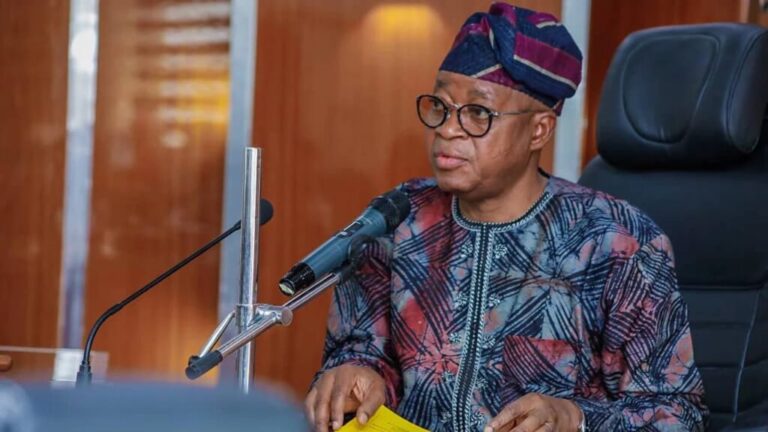The Federal Government aims to generate approximately $3 billion annually through the implementation of the National Single Window (NSW) platform, according to reports from The PUNCH.
Minister of Marine and Blue Economy, Adegboyega Oyetola, made this announcement during a stakeholders forum in Lagos on Tuesday, discussing the launch of the NSW. The platform, which was introduced by President Bola Tinubu in 2024, is designed to streamline trade processes, reduce bottlenecks, and enhance transparency in Nigeria’s trade ecosystem. The Federal Inland Revenue Service (FIRS) and the Nigerian Sovereign Investment Authority (NSIA) have been designated as the agencies responsible for its implementation.
Oyetola emphasized that the NSW is strategically positioned to address significant challenges in Nigeria’s trade sector, including revenue leakages estimated to exceed $3 billion annually and supply chain disruptions affecting 70% of logistics companies in the country.
“This system will not only reduce redundancies in trade processes but also enhance transparency, eliminate revenue leakages, and resolve disruptions in the supply chain,” he stated.
Despite Nigeria’s vast marine and blue economy potential, Oyetola acknowledged the sector’s struggles, citing inefficiencies in port operations, bureaucratic obstacles, and insufficient stakeholder coordination as barriers to growth. To address these, he noted that the ministry and its agencies are actively working to bridge infrastructure gaps and deploy the necessary systems for the successful transition to the new platform.
Oyetola further stressed the government’s commitment to creating an environment conducive to investor confidence, transparency, and the attraction of investments to unlock the sector’s full potential. Efforts are also underway to improve multimodal connectivity by enhancing roads, rail, and inland waterways linking to the ports, which will help reduce transportation costs, improve logistics, and boost trade.
Dr. Doris Uzoka-Anite, the Minister of State for Finance and Economy, also highlighted the transformative impact of the NSW, stating that global paperless trade under the platform is expected to bring an annual economic benefit of around $2.7 billion to Nigeria. She pointed to successful implementations of single-window systems in countries like Singapore, Korea, UAE, Kenya, and Saudi Arabia, which have seen significant improvements in trade efficiency.
According to Uzoka-Anite, the NSW program is designed not only to streamline business processes but also to diversify the economy, reduce reliance on oil exports, and stimulate the growth of non-oil sectors.
Dr. Jumoke Oduwole, Minister of Trade, Industry, and Investment, added that the NSW would provide a centralized digital platform for traders to submit, process, and access trade-related documentation. This would enhance transparency, reduce administrative burdens, and significantly improve the ease of doing business in Nigeria. The platform will also help Nigerian businesses compete more effectively in global markets, create jobs, and strengthen Nigeria’s position as a regional trade hub under the African Continental Free Trade Area (AfCFTA).
Zacch Adedeji, Executive Chairman of the Federal Inland Revenue Service (FIRS), described the NSW as a pivotal move in Nigeria’s economic transformation. He noted that the project would address long-standing issues such as bureaucratic hurdles, port delays, and increased business costs, ultimately boosting Nigeria’s global competitiveness and contributing to the goal of a $1 trillion economy by 2031.
“The establishment of an integrated platform connecting seaports, airports, free trade zones, government agencies, financial institutions, and the private sector will revolutionize Nigeria’s international trade,” Adedeji concluded.

